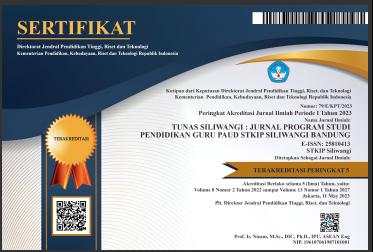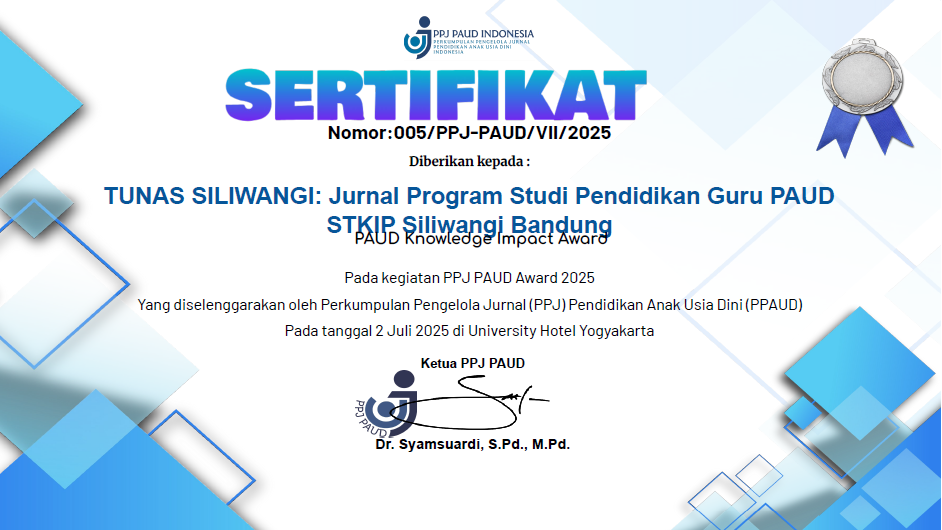The role of effective communication as the key to family resilience in families with young children during times of crisis
DOI:
https://doi.org/10.22460/ts.v10i2.5168Keywords:
Familiy Resilience, Early Childhood, CommunicationAbstract
In contemporary times, research on family resilience is crucial. This is because every family faces unique challenges and is required to adapt, cope with, and recover from various difficulties and obstacles. These challenges may include economic issues, health problems, technological advancements, social changes, and other various problems. Gradually, these issues can weaken the family's function in shaping character and facilitating child development. The objective of this case study is to examine how the communication process serves as a key factor in building family resilience among families with young children. This qualitative research employed a case study approach with three families with young children as subjects. Data was collected through interviews and observations, and analyzed using thematic analysis. The results indicate the presence of components of the communication process as a key to family resilience in the three participating families. All three participating families have established guidelines for communication, avoiding ambiguity, maintaining positive interactions, and having guidelines for resolving existing problems.
References
Author, E., Mccubbin, H. I., & Mccubbin, M. A. (1988). Typologies of Resilient Families: Emerging Roles of Social Class. In Source: Family Relations (Vol. 37, Issue 3).
Black, K., & Lobo, M. (2008). A Conceptual Review of Family Resilience Factors. Journal of Family Nursing, 14(1), 33–55. https://doi.org/10.1177/1074840707312237
Bonanno, G. A., & Burton, C. L. (2013). Regulatory Flexibility: An Individual Differences Perspective on Coping and Emotion Regulation. In Perspectives on Psychological Science (Vol. 8, Issue 6, pp. 591–612). https://doi.org/10.1177/1745691613504116
Creswell, J. W. (2012). Educational Research: Planning, conducting, and evaluating quantitative and qualitative research (4th ed.). Pearson.
Daks, J. S., Peltz, J. S., & Rogge, R. D. (2020). Psychological flexibility and inflexibility as sources of resiliency and risk during a pandemic: Modeling the cascade of COVID-19 stress on family systems with a contextual behavioral science lens. Journal of Contextual Behavioral Science, 18, 16–27. https://doi.org/10.1016/j.jcbs.2020.08.003
Emmy E, Werner, & Ruth Smith. (1992). Overcoming the Odds: High Risk Children from Birth to Adulthood. CornellUniversityPress.
Go Setiawan M. (2000). Menerobos Dunia Anak. YayasanKalamHidup.
Lestari S. (2012). Psikologi Keluarga. Kencana.
Milkie, M. A., Mattingly, M. J., Nomaguchi, K. M., Bianchi, S. M., & Robinson, J. P. (2004). The Time Squeeze: Parental Statuses and Feelings About Time With Children.
Muhammad Thariq. (2017). Membangun Ketahanan Keluarga dengan Komunikasi Interpersonal . JURNAL SIMBOLIKA Research and Learning in Communication Study, 34–44.
Russell, D. W. (1996). UCLA Loneliness Scale (Version 3): Reliability, validity, and factor structure. Journal of Personality Assessment, 66(1), 20–40. https://doi.org/10.1207/s15327752jpa6601_2
Setyowati, Y. (2005). Pola Komunikasi Keluarga dan Perkembangan Emosi Anak (Studi Kasus Penerapan Pola Komunikasi Keluarga dan Pengaruhnya terhadap Perkembangan Emosi Anak pada Keluarga Jawa).
Sunderland, J. (2006). “Parenting” or “mothering”? The case of modern childcare magazines. Discourse and Society, 17(4), 503–527. https://doi.org/10.1177/0957926506063126
Walsh, F. (2003). Family .Resilience: A Framework for Clinical Practice.
Walsh, F. (1996). Special Section Family Resiliance: A Concept and Its Application The Concept of Family Resilience: Crisis and Challenge. In Fam Proc (Vol. 35).
Walsh, F. (2016). Family resilience: a developmental systems framework. European Journal of Developmental Psychology, 13(3), 313–324. https://doi.org/10.1080/17405629.2016.1154035
Walsh, F., & Firestone, S. (1992). Traumatic Loss and Major Disasters: Strengthening Family and Community Resilience FROM INDIVIDUALTO MULTISYSTEMIC APPROACHES IN TRAUMA RECOVERYAND RESILIENCE Groundbreaking studies of World War II and Vietnam veterans and their families (e.g. In Figley & McCubbin (Vol. 46, Issue 2). FPI, Inc. www.FamilyProcess.org
Downloads
Published
Issue
Section
License
Copyright (c) 2025 Aghnia Farrassyania Azhar, Regita Musfita , Ratna Dwi Nurcahyani, Diantifani Rizkita

This work is licensed under a Creative Commons Attribution-ShareAlike 4.0 International License.
The author is responsible for acquiring the permission(s) to reproduce any copyrighted figures, tables, data, or text that are being used in the submitted paper. Authors should note that text quotations of more than 250 words from a published or copyrighted work will require grant of permission from the original publisher to reprint. The written permission letter(s) must be submitted together with the manuscript.







